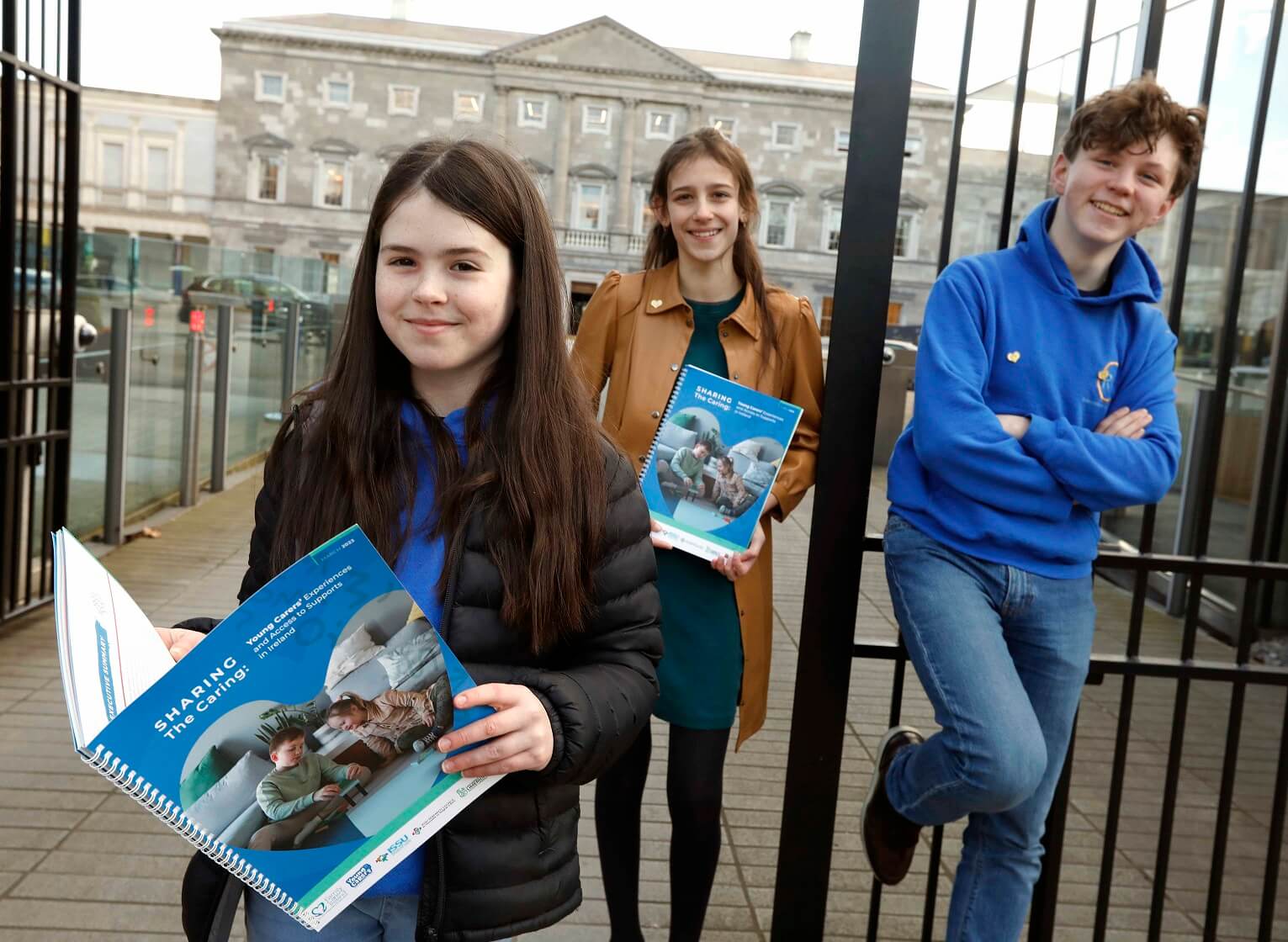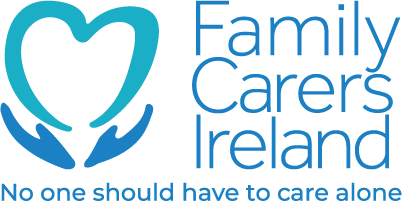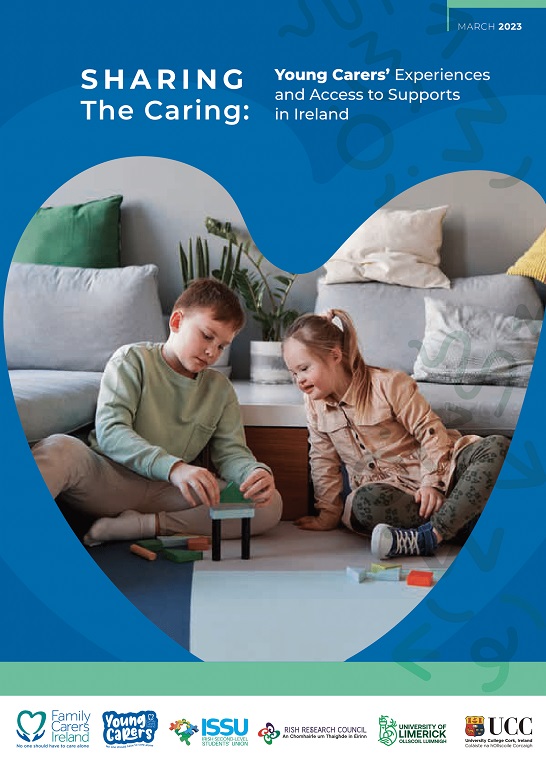-
National Freephone Careline
- About Us
- Carer Supports
- Home Care
- Work With Us
- News & Campaigns
- Policy & Lobbying
- Research
- Get Involved
- Membership
- Donate
Alongside Positive Impacts, Young Carers Can Experience High Levels of Stress, Loneliness and Depression
Posted on Tuesday 07 March 2023

Pictured outside Leinster House at the launch of "Sharing the Caring: Young Carers' Experiences and Access to Supports in Ireland" are (left to right) Sarah Ann Buday (13), Amelia Browne (11) and Liam Donoghue-Dunne (13). PHOTO: Mark Stedman
Tuesday 7th March 2023: Research conducted with a small sample of 131 young and young adult carers within Family Carers Ireland’s network suggests that of those surveyed, many struggle with stress, loneliness and depression while taking care of loved ones. The report was published by University College Cork, University of Limerick and Family Carers Ireland to mark Young Carers Action Day.
There are approximately 67,000 young carers aged between 10-17 years helping to care for parents, siblings, relatives or friends who have additional needs, physical or intellectual disabilities, chronic illnesses, mental health challenges or alcohol or substance misuse issues. For these young people, caring can have a profound impact on their childhood, adolescence and early adulthood.
The research, funded by the Irish Research Council New Foundations programme, has found that young carers, aged 9 to 17, reported that they like who they are because of their caring role, with the majority of those surveyed reporting that they ‘feel good’ about helping. The survey and workshops with young carers found that, alongside these positive impacts, there were high levels of stress and loneliness amongst young carers, with many who took part in the research feeling stressed and like they can’t cope due to their caring role. This suggests that whilst there may be some positive benefits to caring, there can also be significant negative impacts.
Young adult carers, aged 18-24, also reported positive outcomes, such as feeling closer to their family and feeling like they are doing something good. However, negative outcomes associated with their caring role such as stress, loneliness and difficulty coping were common amongst those surveyed. The majority also feel constantly preoccupied about all that they have to do, making it difficult to focus in third level education and employment.
Worryingly, the results indicate that 80% of young carers who participated in the survey had elevated levels of depressive symptoms, placing them at risk. In the young adult carer sample, a similarly high proportion reported elevated depressive symptoms, with 64% at risk of depression. The pandemic has exacerbated many of these challenges faced by young people in caring roles, with young carers reporting that they had become more anxious and stressed since the pandemic began. Such ongoing pressures increase their risks.
Family Carers Ireland is now calling on Government to:
- Establish a cross-departmental working group on young carers.
- Improve the identification of young carers—both self-identification and identification by those around them through a targeted national young carers self-identification campaign.
- Support the transition of young carers to further and higher education and apprenticeships via access programmes.
- Dedicate funding for young carers to access counselling or psychological support from professionals familiar with the challenges of caring.
- Support young carers financially through educational bursaries, the introduction of a Young Carer Grant and increasing carer payments to ensure they meet the needs of caring households.
- Accurately enumerate young carers through Census awareness campaigns and the introduction of a young carer question in the Census at School.
- Actively support young adult carers to engage and remain in employment.
- Provide access to a minimum of 20 respite days, free of charge, for caring households.
- Include young carers in the refreshed National Carers’ Strategy.
Dr Nikki Dunne, Research Manager with Family Carers Ireland, said: "Young carers often don’t identify as carers, instead seeing themselves as a daughter, son, sibling, grandchild or friend. They take on these roles so young that they don’t know any different, so they don’t think of themselves as young carers. As a result, they are often hidden and subsequently absent in social policy and practice. Their voices and their needs have been largely missing from the national dialogue on care, young people and family wellbeing.
"This research draws on the voices of the young people themselves to show how caring can be a positive experience. However, it also shows how the costs and consequences of caring can be heavy, with some young people taking on high levels of care and experiencing challenges in multiple areas of their lives. If left unsupported, this can have a real impact on their mental health and wellbeing, as well as a long-term scarring effect on their lives.
"Young carers absolutely need more Government recognition and support to help with their caring responsibilities. But equally, their strengths and contribution to society should also be celebrated. I hope the Government will take these recommendations seriously and work with us to give young carers and young adult carers a voice at the heart of decision-making."
Dr Carol Kelleher, Institute of Social Science in the 21st Century, University College Cork, said: "While there are over 67,000 young carers in Ireland who provide care on a regular basis to a family member, they largely remain a hidden population. Critically, this means that many do not receive the supports from schools, employers, professionals and wider society that they need. We also know that increased long-term caring can negatively impact young carers' experiences of education and employment, as well as their health and wellbeing. Our research, whilst based on a small sample, highlights how we all might better recognise and support young carers in Ireland and the invaluable work that they do."

